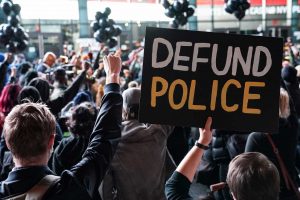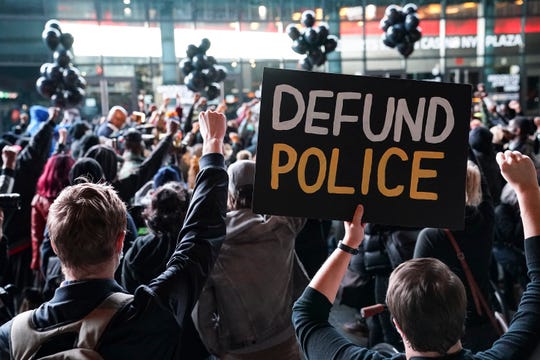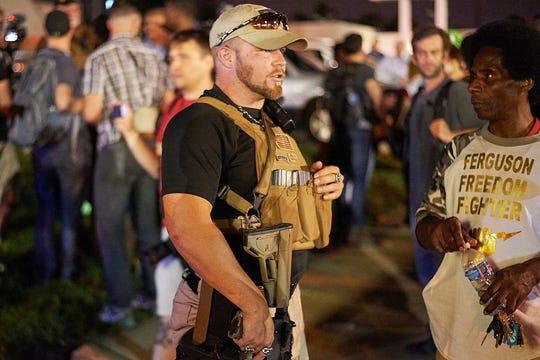Exclusive: Cops outed as racists or extremists are still on the job or were rehired, ADL says

At least 73 law enforcement officers have been outed in the past decade for being members of white supremacist, anti-government and other extremist groups, or showing support for them, a new report from the Anti-Defamation League’s Center on Extremism concludes.
At least 40% of those officers were allowed to remain on duty, the league found. And while 42% left their positions through dismissal, early or forced retirement, and voluntary or forced resignations, at least three people went on to be hired by other law enforcement agencies, the report states.
The report builds on findings from the Plain View Project and Reveal from the Center for Investigative Reporting, which identified hundreds of law enforcement officers who posted racist, Islamophobic, anti-immigrant and misogynist content on Facebook. It focuses on officers who were outed as active supporters of specific extremist groups, rather than those who expressed racist or offensive views.
The findings come as police and sheriff’s departments across the country face scrutiny in the wake of high-profile shootings of unarmed people of color and the murder of George Floyd last year by former Minneapolis police officer Derek Chauvin.
“We’ve been tracking the numbers and, year over year, Black people are three times more likely to be killed by police than white people,” said Samuel Sinyangwe, a racial justice activist who co-founded We The Protesters, a collection of digital tools that track police violence.
“When you see that officers are members of white supremacist organizations and hate groups, that’s not only troubling, but it shows that law enforcement is a system that enables people like that to be violent towards Black people.”
A protester holds a sign that reads "Defund Police" during a rally for the late George Floyd outside Barclays Center, Wednesday, Oct. 14, 2020, in New York. Demonstrators gathered on what would have been Floyd's 47th birthday to call for action in correcting systemic racism in policing and for criminal justice reform. (Photo: John Minchillo, AP)
Cops showed support for hate groups
The report outlines a gamut of incidents in which law enforcement officers showed support for extremist groups: officers who openly sported tattoos of anti-government groups, a sheriff’s deputy who was a senior member of the Oath Keepers, officers who tried to hide their association with the Ku Klux Klan.
The report’s authors concede that 73 might not seem like many, considering there are hundreds of thousands of law enforcement officers in the country. But Alex Friedfeld, one of the researchers who wrote the report, stressed that these are only the cases that were exposed by activists, the media or departments themselves.
“It’s very easy to imagine someone saying, ‘This is a success,'” Friedfeld said. “But one extremist with a gun and a badge is too many.”
Experts worry the 73 cases are evidence of a far more pervasive problem.
“We would like to believe that certain professions, because of the power they have, are made up of a more virtuous lot of people than the general population, but the reality is that there’s very little to support that belief,” said Sarah Vinson, a forensic psychiatrist and associate professor of psychiatry and behavioral sciences at Morehouse School of Medicine.
“There’s no reason to believe that there are fewer white supremacists in law enforcement than in any other group of people.”
The Anti-Defamation League researchers couldn’t figure out whether many of the officers involved in the incidents were still employed as cops. In much of the country, law enforcement personnel records are almost impossible for the public to view.
The researchers found three officers who were hired by another law enforcement agency after they resigned or were fired once their extremist activity was exposed.
Coupled with the number who kept their jobs, Sinyangwe said those cases reveal a lack of accountability for the people entrusted by communities with keeping everybody safe.
“Thoseofficers who are exposed, who are identified, remain on the force,” he said. “If they continue to be allowed to have a badge and a gun and have complete impunity to go into Black and brown communities and translate those views into violence, then you have a system that is bad – not just a group of officers.”
A member of the Oath Keepers walks with his personal weapon on the street during protests in Ferguson, Missouri, on Aug. 10, 2015. The unrest stemmed from the first anniversary of the police shooting of Michael Brown, an unarmed Black teen. (Photo: MICHAEL B. THOMAS/AFP via Getty Images)
Anti-government groups most popular for cops
Anti-government groups including the Oath Keepers and Three Percenters were the most common extremist organizations supported by law enforcement officers, the Anti-Defamation League found. About 40% of the officers examined were connected with these groups, which experts on extremism often categorize as armed, unauthorized militias.
Officers around the country sported tattoos, bumper stickers and clothing supporting the Oath Keepers and Three Percenters. Both groups have been involved in armed clashes with the federal government, and 17 Oath Keepers and five members of the Three Percenters face criminal charges in connection with the Jan. 6 insurrection at the U.S. Capitol.
Experts believe the Oath Keepers are the largest anti-government group in the country. As well as espousing anti-Muslim and anti-immigrant conspiracy theories, the group largely believes that federal, state and local governments are illegitimate and that the ultimate authorities are county sheriffs, who are tasked with interpreting the Constitution.
The Three Percenters are a less-organized, anti-federal government movement based on the highly contested claim that only 3% of Americans took up arms against the British during the Revolutionary War.
While it may seem incongruous for a police officer or deputy to support an anti-government group, they have long attracted and recruited law enforcement officers, said Daryl Johnson, a security consultant and former senior analyst for domestic terrorism at the Department of Homeland Security.
Johnson authored a memo in 2009 warning that white supremacist and other domestic extremist groups were recruiting former members of the military and law enforcement. Since then, he said, these groups have stepped up efforts to find potential members who have skills and knowledge they can put to use.
That poses a dual problem, Johnson said. Anti-government and so-called militia groups have deep ties to racist conspiracy theories, and they have become increasingly vitriolic toward Muslims and immigrants.
“How can someone who is a member of the Oath Keepers be a police officer who is entrusted to be objective in his decisions and treat all people of color the same?” Johnson asked.
Secondly, many of these extremists pledge oaths to their groups, which conflicts with the oaths sworn to law enforcement agencies, Johnson said.
“We’ve had past plots where these extremists have gathered information on federal buildings, police departments, courts and other government buildings as part of their training and operational planning,” Johnson said.
“It’s not out of the realm of possibility that these sworn police officers that are also members of anti-government groups are doing surveillance on the inside of the facilities – reporting back to the group.”
How to fix the problem
Friedfeld, the Anti-Defamation League researcher, said the first step in dealing with extremists in law enforcement is to understand the scope of the problem.
He said he and his colleagues spent months trying to get simple answers from police departments about whether individuals still worked there or whether they had been disciplined.
“We want to see clear systems created that allow people to confidentially raise concerns about extremists,” Friedfeld said. “And we also want transparency over what comes next: How are departments dealing with extremists in their ranks?”
The report lists several other policy recommendations, including increased scrutiny of new hires and better education for law enforcement agencies on how to spot officers’ affiliations with extremist groups.
Vinson, the forensic psychologist, welcomed the report, but posited that it is unlikely to tell many Americans in communities of color anything they don’t already know.
“Honestly, they don’t need the report to tell them,” Vinson said. “They experience it, they see it.”
Source: Read Full Article


